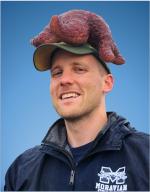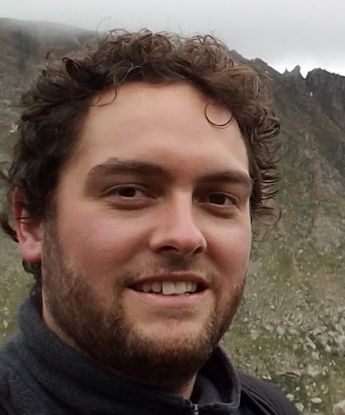Faculty

Cecilia M. Fox | Professor of Biological Sciences, Director of the Neuroscience Program and Health Professions Advisor
Office location: PPHAC 216
Lab location: Collier 310
Office phone: 610-861-1426
Email: foxc@moravian.edu
Education
B.S. in Biology, Manhattan College
Ph.D. in Neurobiology and Anatomy, University of Kentucky
Teaching and Research Interests
My teaching responsibilities include the following courses: Neuroscience (NEUR/BIOL263), Introduction to Neuroscience Methods (NEUR 367), Neuroscience Seminar (NEUR373), Brain Sex (NEUR218), Anatomy and Physiology (BIOL103–104), Human Physiology (BIOL350) and Human Anatomy (BIOL398).
My primary area of research focuses on the neurobiology of aging and neuroprotective effects of antioxidants/anti-inflammatories in animal models of neurodegeneration. My lab attempts to define the scope of protection afforded by such compounds as selenium, capsaicin and curcumin in the rat model of Parkinson's disease. A second area of research that was recently funded by the Council of Independent Colleges Intergenerational Grant examines the impact of personalized music on cognition and quality of life measures in elders living with dementia.
Fox CM, Incorporating Service-Learning and Scientific Advocacy into an Undergraduate Neuroscience Curriculum, Neuroscience Teaching Conference, NC, 2024
Fox CM, Training the Trainers of the Next Generation of Neuroscience Advocates, Faculty for Undergraduate Neuroscience Workshop, Seattle, WA, 2023
Fox, CM, Moravian University’s Music and Memory Program: How to Bridge the Generational Divide, Northeastern University, 2023
Fox CM, The Use of Personalized Music to Impact Cognition and Quality of Life Measures in Elders Living with Dementia: Bridging the Generations, Phoebe Institute on Aging Conference, PA, 2021
Lopez de Boer R and Fox CM, The impact of curcumin on the production and metabolism of dopamine in the 6-hydroxydopamine model of Parkinson’s disease: an interdisciplinary study. Lehigh Valley SfN Undergraduate Research Conference, 2021
McHugh R and Fox CM, The neuroprotective potential of capsaicin in the 6-hydroxydopamine rat model of Parkinson’s disease. Lehigh Valley SfN Undergraduate Research Conference, 2021
Mondok C and Fox CM, The use of combined curcumin and vitamin E administration in the 6-hydroxydopamine rat model of Parkinson’s disease. Lehigh Valley SfN Undergraduate Research Conference, 2021
Lopez de Boer R, Mondok C and Fox CM, How curcumin and vitamin E have the potential to protect against acute 6-hydroxydopamine neurotoxicity in a rat model of Parkinson’s disease. Faculty for Undergraduate Neuroscience Conference, 2020
Jones M, Buskirk M and Fox CM, The Impact of Personalized Music on Cognition and Quality of Life Measures in Elders Living with Dementia, Faculty for Undergraduate Neuroscience Conference, 2019
Jones M, Buskirk M and Fox CM, Bridging the Generational Divide: Partnering Undergraduates and Elders Through Music as Part of Brain Awareness Outreach, Society for Neuroscience Conference, 2019
Seitz B, Jones M and Fox CM, Challenges and effects of personalized music on cognition in dementia patients Lehigh Valley Society for Neuroscience Conference, 2018
Seitz B and Fox CM, Effects of personalized music on cognition in dementia patients: a Music and Memory Pilot Study, Faculty for Undergraduate Neuroscience Conference, 2017
Fox CM, Highlighting advocacy through brain awareness service learning throughout the Lehigh Valley of Pennsylvania, Society for Neuroscience Conference, 2017
Ryan J, Seitz B, Cusimano M, O’Hanlon K, Palmeri M and Fox CM, Incorporating advocacy in brain awareness service learning programs using a liberal arts approach, Society for Neuroscience Conference, 2017
Kanakamedala L and Fox CM, The neuroprotective potential of curcumin in the 6-hydroxydopamine rat model of Parkinson’s disease, Lehigh Valley SfN Undergraduate Research Conference, 2017
Jordan R and Fox CM, The impact of long term exposure to curcumin in the 6-hydroxydopamine nigral lesioned rat, Lehigh Valley SfN Undergraduate Research Conference, 2017
Spencer M, Ghoweri AO and Fox CM, The neuroprotective potential of intranasal DNSP-11 in a 6-OHDA rodent model: a behavior and cellular study, Lehigh Valley SfN Undergraduate Research Conference, 2016

Sarah K. Johnson | Associate Professor of Psychology and Neuroscience
Office location: PPHAC 224
Office phone: 610-625-7013
Email: skjohnson@moravian.edu
Education
B.A., Bucknell University
Ph.D., Temple University
Research Interests
Johnson's research focuses on semantic memory—i.e., general knowledge—and the processes used to organize it. She studies our memory for music and how it changes or doesn't change with age. She is shifting into a new area of research looking at the semantic-network connections that underlie stereotyped attitudes. Lastly, she conducts research on pedagogy—focusing on flipped classrooms and other active learning approaches, and studying students' comfort level with alternative teaching styles. Other areas of academic interest include executive function, cognitive neuroscience as a whole, and frontal-lobe functioning in particular.
Sarah K. Johnson received her B.A. from Bucknell University and her Ph.D. in cognitive psychology with a neuroscience focus from Temple University. Her current research focuses on the role of executive processes, which are mediated by the frontal lobes of the brain, in memory. In particular, Dr. Johnson studies inhibitory processes that can impair our ability to retrieve memories. Her research explores how practicing some information can actually make us temporarily “forget” other related information and investigates the inhibitory components of tests used to diagnose frontal-lobe function. Dr. Johnson is the faculty advisor to the Psychology Club.
Contributing Research Mentors from Biological Sciences

Kara Mosovsky | Associate Professor and Chair
Office location: Collier 311
Lab location: Sally 317
Office phone: 610-861-1428
Email: mosovskyk@moravian.edu
Education
B.S. in Animal Bioscience, The Pennsylvania State University
M.S. in Immunology and Infectious Disease, The Pennsylvania State University
Ph.D. in Microbiology, Colorado State University
Research Interests
Dr. Mosovsky studies host-pathogen interactions, particularly those between bacterial pathogens and mammalian hosts. Her research and interests include antibiotic resistance, intracellular infections, and infectious disease.
Kara Mosovsky's Selected Publications
Pomposello M, Nemes K, Mosovsky K (2020). "Dietary Antioxidant Seleno-L-Methionine Protects Macrophages During Infection with Burkholderia thailandensis". PLoSONE 15(9): e0238174. (Moravian student authors in italics)
Mosovsky K (2019). "The Use of a Fast-Paced, Competitive Drawing Game as a Student-Approved Review Strategy for Microbiology." Journal of Microbiology and Biology Education 19(3): 19.3.107.
Mosovsky K (2019). "Time to Branch Out." Science 364(6444): 1002.
Collins, C, Mosovsky K (2018). "Antibiotic Tolerance: Distinguishing between Classical Resistance and Persistence in a Macrophage Infection Model." Fine Focus, 4(1): 117-129. (Moravian student author in italics)
Mosovsky K, Silva E, Troyer R, Propst-Graham K, Dow S (2014). Interaction of IFN-γ Induced Reactive Oxygen Species with Ceftazidime Leads to Synergistic Killing of Intracellular Burkholderia". Antimicrobial Agents and Chemotherapy 58(10): 5954-63.
Chen Q, Mosovsky KL, Ross AC (2013). "Retinoic acid and α-galactosylceramide regulate the expression of costimulatory receptors and transcription factors responsible for B cell activation and differentiation." Immunobiology 218(12): 1477–1487.
Chen Q, Mosovsky KL, Ross AC (2011). "Retinoic acid and α-galactosylceramide differentially regulate B cell activation in vitro and augment antibody production in vivo." Clinical Vaccine Immunology 18(6): 1015-20.

Joshua Lord | Assistant Professor
Office location: PPHAC 218
Lab location: Collier 317
Office phone: 610-861-1414
Email: lordj02@moravian.edu
Education
B.A. in Biology, Colby College
M.S. in Marine Biology, University of Oregon
Ph.D. in Oceanography, University of Connecticut
Research Interests
I teach courses related to marine biology and invertebrate ecology, including Animal Behavior, Marine Ecology, and a variety of others. My research focuses on understanding how invasive species and changing environmental conditions can affect predation and competition between species. Along with the students in my lab, I work with a variety of marine species (especially crabs, snails, and biofouling organisms) and test their responses to climate change and resistance to predation.
Joshua Lord's Selected Publications
Rappaport SD, Lord JP (2021) Linear dominance hierarchies in female grass shrimp Palaemon pugio. The Biological Bulletin 241(1).
Lord JP (2021) Using a game to teach invasive species spread and management. Journal of College Science Teaching. Accepted, in press.
Lord JP (2021) Size affects intraspecific aggression and response to predation threat in juvenile lobsters. Marine Biology: 168:51.
Lord JP, Moser RM, Buonocore EM, Sylvester EE, Morales MJ, Granitz AP, Disipio A, Blakely E, O’Sullivan-Evangelista SL, Mateo TF, Chlebove GJ, Carey CM, Lucas O (2021) Dominance hierarchies in marine invertebrates. The Biological Bulletin 240(1):1-13.
Lord JP, Rappaport SD (2021) Snail morphological and behavioral predator avoidance strategies vary by site. American Conchologist 49(1).
Froehlich, Kyle R, Lord JP (2020) "Can ocean acidification interfere with the ability of mud snails (Tritia obsoleta) to sense predators?" Journal of Experimental Marine Biology and Ecology 526: 151355.
Boch CA, DeVogelaere A, Burton E, King C, Lord JP, Lovera C, Litvin S, Kuhnz L, Barry JP (2019) "Coral translocation as a method to restore impacted deep-sea coral communities." Frontiers in Marine Science 6:540.
Lord JP, Harper EM, Barry JP (2019) Ocean acidification may alter predator-prey relationships and weaken nonlethal species interactions. Marine Ecology Progress Series 616: 83-94.
Barry JP, Graves D, Kecy C, Lovera C, Boch CA, Lord JP (2018) Chasing the future: how will ocean changes affect marine life? Oceanography 30: 62-73.
Lord JP, Barry JP, Graves D (2017 "Impact of climate change on direct and indirect species interactions." Marine Ecology Progress Series 571: 1-11 (Feature Article).
Lord JP, Barry JP (2017) "Juvenile mussel and abalone predation by the lined shore crab Pachygrapsus crassipes." Journal of Shellfish Research 36: 209–213.
Lord JP (2017) "Potential impact of Asian shore crab Hemigrapsus sanguineus on native northeast Pacific crabs." Biological Invasions 19: 1879-1887.
Lord JP, Williams LR (2017) "Increase in density of genetically diverse invasive Asian shore crab (Hemigrapsus sanguineus) populations in the Gulf of Maine." Biological Invasions 19: 1153–1168.
Lord JP (2017) "Impact of seawater temperature on growth and recruitment of invasive fouling species at the global scale." Marine Ecology 38: e12404.
Lord JP (2017) "Temperature, space availability, and species assemblages impact competition in global fouling communities." Biological Invasions 19: 43–55.

Sara McClelland | Assistant Professor
Office location: Collier 312
Lab location: Collier 320
Office phone: 610-861-1427
Email: mcclellands@moravian.edu
Education
B.S. in Biology, Wheeling Jesuit University
M.S. in Marine Biology, University of North Carolina Wilmington
Ph.D. in Biological Sciences, Duquesne University
Research Interests
I am interested in understanding how human-induced environmental changes affect vertebrate physiology. My current research focuses on the impacts of ecologically relevant concentrations of pesticides on neurodevelopment, behavior, and body morphology using an amphibian model. Over 1 billion pounds of pesticides are used annually to control pests within the US. Unfortunately, these pesticides often contaminate natural habitats and can negatively impact non-target organisms. In addition to my interest in environmental toxins, I also investigate the role of the stress hormone corticosterone in neurological and morphological changes due to increased stress during development.
Sara McClelland's Selected Publications
McClelland SJ and Woodley SK. 2020. "Water-borne corticosterone assay is a valid method in some but not all life-history stages in Northern Leopard Frogs." General and Comparative Endocrinology. In review.
Siegel D, Murray C, Pereira K, McClelland SJ, Wren S, Waltz T, Long CL. 2020. "Re-examining the Heads of Eurycea bislineata." Copeia. In press.
Durbin MR, Pelcher LR, McClelland SJ, and Woodley SK. 2020. "Effects of early ethanol exposure on Lithobates pipiens tadpole development." Journal of Young Investigators. In press.
McClelland SJ, Bendis RJ, Relyea RA, Woodley SK. 2018. "Insecticide-induced changes in amphibian brains: How sublethal concentrations of chlorpyrifos directly affect neurodevelopment." Environmental Toxicology and Chemistry 37(10):2692-2698.
McClelland SJ, Gay M, Pabst DA, Dillaman R, Westgate AJ, and Koopman HN. 2012. "Microvascular patterns in the blubber of shallow and deep diving Odontocetes." Journal of Morphology 273(8):932-942.

Daniel Proud | Assistant Professor
Office location: Collier 323
Lab location: Collier 322
Office phone: 610-625-7114
Email: proudd@moravian.edu
Website: https://danielproudlab.com
Education
B.A. in Mathematics, B.S. in Biology, Virginia Wesleyan College
Ph.D. in Environmental & Evolutionary Biology, University of Louisiana at Lafayette
Research Interests
The primary focus of work in my lab is to address fundamental questions related to the origin and maintenance of biodiversity and distribution of species, especially arachnids, using an integrative approach. One particular group of interest in my lab is the arachnid order Opiliones (harvestmen). Given their ancient origins and limited dispersal abilities, harvestmen provide an ideal, non-model system to study fundamental concepts in evolutionary biology and biogeography. Ongoing projects include studies of arachnid diversity and systematics, Caribbean island biogeography, Gondwanan biogeography, population genetics, evolutionary ecology, and functional morphology.
Daniel Proud's Selected Publications
Kury, A.A., A. Pérez-González, and D.N. Proud. 2019. "A new Indo-Malayan family of Grassatores (Arachnida, Opiliones, Laniatores)" Invertebrate Systematics 33(6): 892-906.
Proud, D.N. and V.R. Townsend Jr. 2019. "Unusual penis morphology among cosmetid harvestmen (Arachnida: Opiliones) from Mesoamerica." Zoomorphology 138(2): 233-247.
Townsend, V.R. Jr., A. Pérez-González, and D.N. Proud. 2019. "Putative mating plugs of harvestmen (Opiliones, Laniatores)." Zoologischer Anzeiger 278:101-109.
D.N. Proud, M.B. DaSilva, and M.E. Bichuette. 2018. "Light from dark: a relictual troglobite reveals a broader ancestral distribution for kimulid harvestmen (Opiliones: Laniatores: Kimulidae) in South America." PLOS ONE 12(11): e0187919.

